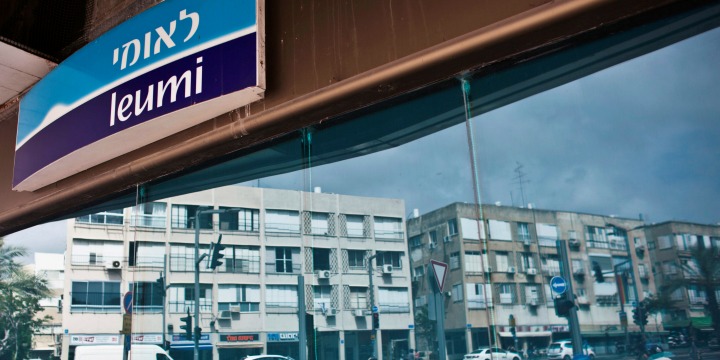
A branch of Israel’s Bank Leumi. Photo: Reuters / Nir Elias / File.
New Zealand’s sovereign wealth fund divested from five Israeli banks on Wednesday, citing their alleged funding of Israeli settlements in the West Bank as the reason, and drawing sharp criticism for focusing on the Jewish state while ignoring the world’s major abusers of human rights.
In a statement, The Guardians Board of New Zealand Super Fund (NZSF) — which manages assets in excess of $36 billion (US) — said they had “excluded five Israeli banks on responsible investment grounds.”
“There is credible evidence that the excluded companies provide project finance for the construction of Israeli settlements in the Occupied Palestinian Territories, which is an integral aspect of settlement construction,” the statement asserted. “We believe that without the banks’ involvement the settlement activity would not be proceeding at the scale seen in recent times.”
Investments worth a combined $4 million will now be withdrawn by the NZSF from the five Israeli banks in question — First International Bank of Israel, Bank Hapoalim, Israel Discount Bank, Bank Leumi and Bank Mizrahi-Tefahot.
Related coverage

March 3, 2021 6:37 pm
The board’s statement underlined that the decision to divest from the Israeli banks was in the spirit of the New Zealand government’s policy towards the Israeli-Palestinian conflict.
“In June 2020 the New Zealand Government released the following press statement: ‘New Zealand is a long-standing supporter of Israel’s right to live in peace and security. However, successive New Zealand governments have also been clear that Israeli settlements are in violation of international law and have negative implications for the peace process,” the statement said. It concluded that the banks’ “activities are inconsistent with the UN Global Compact, the key benchmark against which the Guardians measures corporate behavior, and engagement with the companies is unlikely to be successful.”
“Given the small size of the holdings in the excluded companies the decision, will not have a material financial impact on NZ Super Fund performance,” the board added.
The divestment decision triggered a strong protest from the Israel Institute of New Zealand (IINZ), a pro-Israel think tank and advocacy group.
In a detailed briefing published on Wednesday, the IINZ argued that the Super Fund’s decision had undermined New Zealand’s reputation as a “fair actor.”
“The decision to exclude Jewish companies is antithetical to the very purpose and spirit of the Super Fund’s constituting Act which is supposed to interpret and follow, not dictate, NZ foreign policy,” the briefing stated.
It continued: “It is curious that only Israeli banks listed in the NZSF have been divested from, and not those in China, Turkey, Russia, or Saudi Arabia.”
The briefing accused Catherine Savage — who chairs the Guardians Board — of basing the decision on reports from pro-Palestinian NGOs, including “Who Profits?”, a group that blacklists Israeli companies allegedly involved in financing the “occupation” and which supports the broader Boycott, Divestment and Sanctions (BDS) campaign targeting Israeli alone.
Prof. Gerald Steinberg — president of the Jerusalem-based research organization NGO Monitor, which tracks NGO-led divestment campaigns against Israel — said that the growth in ethical investing had opened up a crucial space for boycott activists.
“There is an industry that’s grown up in the last 30 years of assessing investments and holdings on the basis of ethical business decisions,” Steinberg told The Algemeiner on Wednesday. “In those frameworks, a number of boycott-related organizations have made substantive inroads and have spun the reality on the ground into support for boycotts — and apparently, that’s the case in New Zealand.”
Steinberg observed that some European pension funds had divested from Israeli companies citing similar concerns.
“It’s worth noting that most of these funds have lost money since divesting,” he said. “More importantly, they have been subjected to strong legal challenges, because those decisions have been made on the basis of ideology, not evidence.”
The IINZ briefing also argued that the widespread and regular condemnation of Israel at the UN was a reflection of the number of its non-democratic and authoritarian member states, many of which refuse to recognize Israel’s basic legitimacy.
“It would seem illegitimate for the New Zealand Super Fund to consider those despotic, non-democratic nations as part of the ‘world community’ with which to uphold New Zealand’s reputation as demanded by the words of the Super Fund’s constituting Act,” the IINZ said. “Yet that is precisely what Ms Savage has allowed to happen by relying on biased United Nations and NGO reports.”
Later on Thursday, some New Zealand media outlets reported that the NZSF was also considering divesting from China, whose Communist regime is actively persecuting the Muslim Uyghur minority.
The Super Fund’s CEO, Matt Whineray, told the New Zealand Business Report that the Guardians Board was reviewing the $485 million it currently has invested in Chinese companies.
 RSS Feed
RSS Feed















 March 4th, 2021
March 4th, 2021  Awake Goy
Awake Goy  Posted in
Posted in  Tags:
Tags: 













